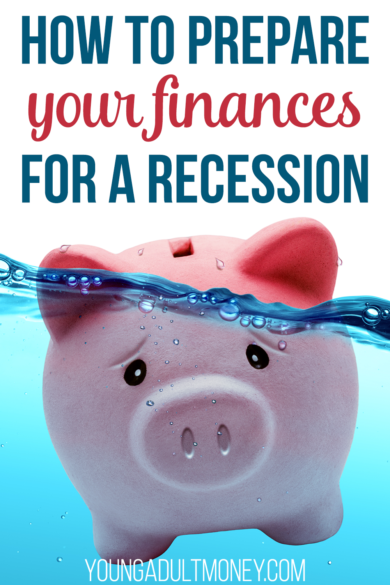 We’ve seen unprecedented growth the past ten years since the last recession.
We’ve seen unprecedented growth the past ten years since the last recession.
According to Goldman Sachs in early 2019, the 10-year trailing annual return of 15% ranks in the 94th percentile of all 10-year periods going back to 1880.
There are millions in the workforce today – including young millennials and the oldest of generation Z – who have never worked during a recession or economic downturn.
The purpose of this post isn’t to debate what causes the boom-bust cycle, but it’s tough to deny that a downturn won’t come at some point in the near future. How soon that will happen, and how drastic of a downturn it will be, are unknown.
The best thing you can do today is to prepare your finances for a recession. If it doesn’t hit, this prep work is still beneficial. If a recession does hit, you’ll be ready for it.
Cash is King
When you hit a rough patch from a layoff or large unexpected expense like a surgery, having cash set aside in an emergency fund makes things a lot easier – or at least a little less stressful. I say it again and again: you need an emergency fund!
Having that cash set aside is a smart thing to do even if we don’t hit a recession, but is even more important if we hit a downturn. Layoffs will happen more often during a recession, meaning the odds of your specific job being eliminated increase. It also will likely take much longer to find a job than it would during times of economic growth.
If you don’t have much in savings right now, the prospect of building an emergency fund can be daunting. Instead of focusing on the ultimate number you want to hit, concentrate on making progress where you can. Even $100 a month towards a savings account is progress.
Another thing to think about is how much money you have in stocks versus cash. If you have almost no money in cash but a lot in stocks, it may make sense to sell some of your stocks to fund a cash emergency fund. The reason being that if stocks tank you may end up being forced to sell at the bottom of the market.
Consider Looking for Extra Sources of Income
If you don’t already have a way to make extra money above and beyond your 9-5, it makes a lot of sense to think about it before something drastic happens, such as a job loss.
Just a couple reasons this makes so much sense:
- Can help you funnel money towards an emergency fund or debt pay-down
- Gives you confidence that you can make money even if your 9-5 is taken away from you
The sooner you start the more pickier you can be. I didn’t make a dime the first year of blogging as a side hustle, but I was putting in a ton of work. Some of the more desirable side hustles, which typically are some form of business ownership, can take a while to get off the ground. I’ve been blogging for seven years and I couldn’t have anticipated where starting a blog would take me. But at the same time I warn others that it only makes sense to start a blog if you are committed to working on it for at least six months, minimum.
Another example is an Etsy store. In theory you could decide to start an Etsy storefront today and have a fully stocked store within a month. But in reality it could take you months and months of promoting and word-of-mouth to make any significant revenue, let alone profit. The sooner you can start the better.
If you need money quick there are always side hustles that can bring in more consistent cash quickly, but if you want to build a business it’s going to take some time.
To help you brainstorm here are 10+ ways I’ve made side income. If you want a bigger list here are 50+ online and at-home side hustles.
Student Loan Debt
Every day 3,000 borrowers default on their student loan debt.
This doesn’t have to happen.
Federal student loans have income-driven repayment plans that adjust your required monthly payment according to your income. Your payment could be as low as $0.
If you are stretching your finances to try to pay extra towards your student loans at the expense of building an emergency fund, paying off other debt, or in general building up other areas of your finances, it makes sense to consider an income-driven repayment plan.
Here’s a post explaining income-driven repayment plans. I also cover them extensively in Student Loan Solution.
Private student loans are a different beast. There are not income-driven repayment options or opportunities for loan forgiveness, and paying them back should be prioritized over federal student loans.
One thing you can do with private student loans is look for better interest rates. Many undergrad private student loans have terrible interest rates, sometimes in the double digits. There’s a lot of competition and you can refinance at a lower interest rate through a different lender. You also can refinance for a longer term, such as 15 or 20 years. While this isn’t ideal because you will pay more in interest compared to a ten-year repayment plan, it could help make the payment more affordable.
What other debt do you have?
Credit card debt should always be at the top of your priority list. The sooner you can get rid of the double-digit interest, the better.
That’s easier said than done, though. $5,000 of credit card debt could feel insurmountable for one person while it may be possible for another person to pay it off in five months. It all depends on your income and your specific financial situation.
Understanding your cash flow is the first step to repaying credit card debt, or any debt for that matter. The only way to know what cash flow you are working with is by analyzing your income and expenses from the past few months. You can pull this automatically using Tiller and our automated budget spreadsheet.
Finding areas you can cut your spending is one approach to increase your cash flow. Other options include increasing income (my preferred approach) and cutting the interest rate on your debt. Using a personal loan to refinance your credit card debt at a lower interest rate is one strategy people use.
If you are feeling overwhelmed with the amount of debt you have, it may make sense to discuss your options with a debt lawyer. In this post I interview Leslie Tayne, someone I have gotten to know over the past few years and who I trust.
Assess your Job Situation
It’s always beneficial to assess your job situation, but typically when I talk about this I’m focused on compensation and whether you are getting paid as much as you should be. Changing the mindset to preparing for a recession also changes what you’ll focus on when assessing your job situation.
Here are a few questions to ask yourself:
- How transferable are your skills?
Some of us have very specialized jobs. You may do a very specific type of accounting, for example, that is only a skill set that is needed by specific businesses in specific industries.
If you have a specialized skill and you were to lose your job, would you be able to articulate how your broader skill set is transferable? Or would you struggle pointing to anything other than that one specific skill you built, that doesn’t really transfer to many companies?
- What skills or experience can you gain in the short-term to make you a more desirable job candidate?
I encourage people to make it a habit of looking at job openings every few months, even when they are not looking for a new job. Why? Because you can see what skills and experience employers are looking for. If you have the skills and experience, great, if not you have time to get the skills and experience before you are actively looking for a new job.
Like everything else, this becomes even more important with a potential recession on the horizon. To give yourself the best shot of staying employed during a downturn, understand what skills and experience your employer – and other employers – prioritize. Write them down. Make a plan for learning or expanding those skills. You may have to do some things that are uncomfortable, such as proactively seeking out public speaking opportunities, but it’s so much easier to work on these things now compared to after a layoff.
- Is your resume up-to-date?
For most people it’s not that time-consuming to update your resume. At the same time, there are millions in the workforce who haven’t had to update their resume in five or more years, some even longer than that.
It’s an easy thing to put off, so block off some time on your calendar within the next month and spend thirty minutes getting your resume up-to-date.
- Will your employer get hit hard during a recession?
You may have heard the phrase “recession-proof.” Some employers are going to have business no matter what, and that includes industries like Health Care (providers) and IT. But other companies may be very sensitive to a downturn. Personal and corporate travel is something that will inevitably be pulled back in a recession.
There are also some companies who may rely too much on one client or account. If the company loses that client, layoffs happen.
Give some thought about how sensitive your company will be during a recession. At the very least it may motivate you to prepare.
Remember, because employers slam the brakes on new hiring during a recession there is going to more candidates for less jobs. The best way to prepare for this is being confident in the value you can provide an organization. If you don’t already have that confidence, spend time building the skills you need to succeed.
Calculate your “Bare Bones” Budget
Have you ever calculated what the absolute lowest amount of money you can live off of each month?
Most people haven’t. It can be a useful exercise, though, especially as we are potentially heading towards a recession.
The exercise is relatively simple. Look at all your spending from the past few months (I recommend using Tiller to do this automatically) and determine what you spend in an average month. Then, go category-by-category and see what you would spend if you had to cut everything out that you could. We’re talking Netflix, Hulu, restaurants, anything and everything possible.
The point of having this bare-bones budget is to give you confidence that you can weather a temporary loss of income through a layoff. Your emergency fund of three months may actually stretch to four or five months under a bare-bones budget.
Regardless of how much you can cut back, you need an emergency fund to avoid going into credit card debt during a layoff.
I hope this has been a helpful overview of proactive ways to prepare your finances for a recession. I think we can all agree there is always more that can be done. We don’t know when we will hit a downturn, but we do know that now is the time to prepare.


Absolutely agree with the entire post
Solid posts. I definitely believe that a recession is coming sooner or later. Since I’ve started my new job, I’ve been able to put more money on the debt including my student loans. For me, it’s hustle season, so I’m going to go even harder to make sure that I don’t suffer when the recession hits.